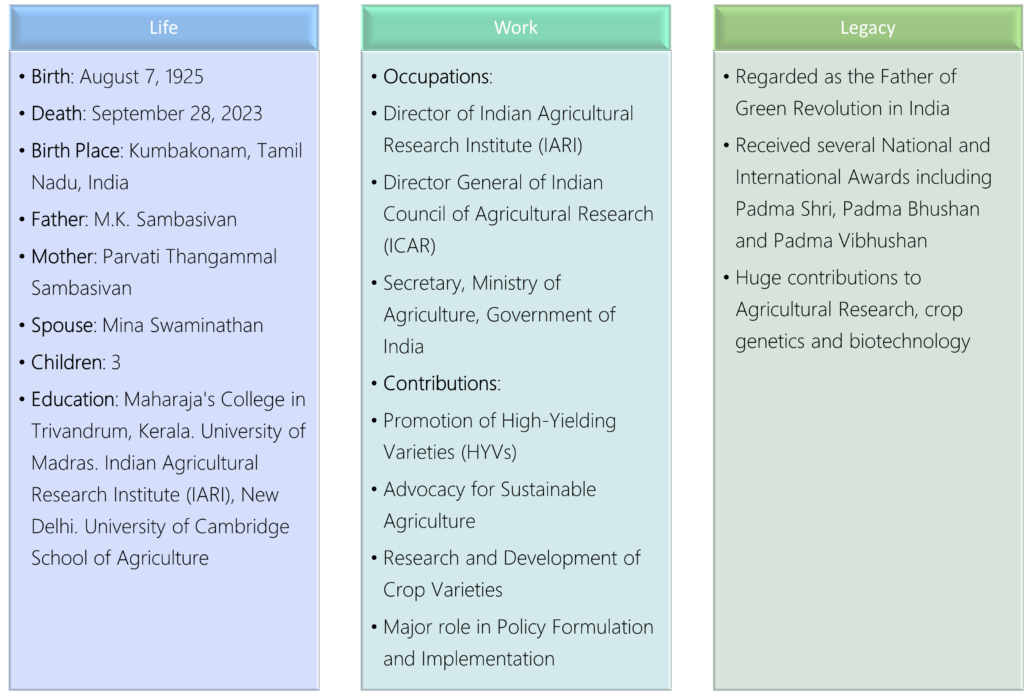Dr. Monkombu Sambasivan Swaminathan or M. S. Swaminathan was a prominent Indian agricultural scientist and geneticist. Furthermore, he was known for pioneering contributions to agricultural research, food security, and sustainable development. Dr M.S. Swaminathan is also called the Father of Green Revolution in India. He is also widely recognized for his pivotal role in promoting and implementing the Green Revolution. As a renowned agricultural scientist, geneticist, and administrator, Dr. Swaminathan made further significant contributions to agricultural research, policy formulation, and technology dissemination in India.

Econometrics Tutorials with Certificates
The life of M.S. Swaminathan
Early Life, Education and Career in Agricultural Research
Dr. M. S. Swaminathan was born on August 7, 1925, in Kumbakonam, Tamil Nadu, India. He pursued his undergraduate studies in Zoology at Maharaja’s College, Ernakulam. Later, he completed postgraduate studies in agricultural botany at the Indian Agricultural Research Institute (IARI), New Delhi.
Dr Swaminathan started his career as a researcher at the Indian Agricultural Research Institute (IARI). Additionally, his focus was on plant genetics and crop improvement.
He also got a PhD in plant genetics from the University of Cambridge, UK. Dr Swaminathan’s research on wheat genetics and breeding laid the foundation for the development of high-yielding varieties (HYVs) of wheat, which later revolutionized Indian agriculture.
Leadership in Agricultural Development
Dr. Swaminathan also served as the Director of the Indian Agricultural Research Institute (IARI) from 1966 to 1972. As the Director, he played an important role in promoting the Green Revolution in India.
He also served as the Director General of the Indian Council of Agricultural Research (ICAR) and Secretary to the Government of India, Ministry of Agriculture. As the head of ICAR, Dr Swaminathan also spearheaded major initiatives to enhance agricultural research and rural development in India.
Advocacy for Food Security and Sustainable Agriculture
Dr M.S. Swaminathan was a leading advocate for food security, sustainable agriculture, and rural livelihoods on national and international platforms. He also emphasized the importance of the scientific approach to agricultural development, environmental conservation, and poverty alleviation.
Jobs and Occupations held by M.S. Swaminathan
- Agricultural Scientist: Firstly, Dr M.S. Swaminathan is known for his contributions as an agricultural scientist. He conducted groundbreaking research in the fields of plant genetics, crop improvement, and agricultural biotechnology.
- Director of Indian Agricultural Research Institute (IARI): Dr Swaminathan served as the Director of the Indian Agricultural Research Institute (IARI) from 1966 to 1972. During his tenure, he played a key role in promoting research and development initiatives aimed at transforming Indian agriculture through the Green Revolution.
- Director General of Indian Council of Agricultural Research (ICAR): Dr Swaminathan also served as the Director General of the Indian Council of Agricultural Research (ICAR), the apex body for agricultural research and education in India.
- Secretary, Ministry of Agriculture, Government of India: Dr Swaminathan held the position of Secretary to the Government of India, Ministry of Agriculture. He was responsible for formulating and further implementing agricultural policies, programs, and initiatives across India.
- Advisor and Consultant: Dr Swaminathan has also served as an advisor and consultant to various national and international organizations, governments, and agencies on issues related to agriculture, food security, and sustainable development.
- Chairman of National Commission on Farmers: Dr Swaminathan chaired the National Commission on Farmers (NCF) in India. It was established to address the challenges faced by Indian farmers and, therefore, to recommend policy measures for agricultural reform. The NCF’s recommendations, known as the “Swaminathan Commission Report,” have significantly impacted agricultural policy in India.
Contributions of M.S. Swaminathan
Promotion of High-Yielding Varieties (HYVs)
Dr Swaminathan played a pivotal role in promoting the adoption of high-yielding varieties (HYV seeds) of crops. This is especially true for crops such as wheat and rice in India during the Green Revolution. His contributions to developing and disseminating HYV seeds significantly increased agricultural productivity and food production. It further laid the foundation for India’s self-sufficiency in food grains.
Advocacy for Sustainable Agriculture
Dr Swaminathan was a leading advocate for sustainable agriculture practices that also promote environmental conservation and biodiversity. Moreover, he emphasized the importance of agroecology, organic farming, and integrated pest management as viable alternatives to conventional, input-intensive agriculture.
Research and Development of Crop Varieties
As a renowned agricultural scientist, Dr Swaminathan conducted extensive research on crop genetics, breeding, and biotechnology. His work led to the development of new crop varieties with improved traits such as high yield, pest resistance, drought tolerance, and nutritional value. This contributed massively to agricultural innovation and food security.
Policy Formulation and Implementation
Dr Swaminathan played a key role in formulating agricultural policies and strategies at both the national and international levels. As Director General of the Indian Council of Agricultural Research (ICAR) and Secretary to the Government of India, Ministry of Agriculture, he further helped shape agricultural development and implemented initiatives to address the needs of farmers and rural communities.
Empowerment of Small Farmers
Dr Swaminathan was a vocal advocate for the rights and welfare of small farmers, particularly in developing countries. He also promoted initiatives aimed at empowering farmers through access to resources, technology, markets, and support services, with a focus on enhancing their productivity, income, and livelihood security.
Capacity Building and Education
Dr Swaminathan also played a crucial role in building the capacity of agricultural professionals, researchers, and extension workers through education, training, and knowledge sharing. Additionally, he was actively involved in establishing educational institutions and research centres to promote agricultural innovation and human resource development.
International Collaboration and Cooperation
Dr M.S. Swaminathan was also a leading figure in promoting international collaboration and cooperation on agricultural research, development, and policy. Moreover, he actively engaged with international organizations, governments, and stakeholders to address global challenges related to food security, poverty alleviation, and sustainable development.
Significant Publications by M.S. Swaminathan
- The Green Revolution: Escaping from a Faustian Bargain”: Journal of the American College of Nutrition, 1996.
- “Bio-Economic Criteria for Cropping System Planning”: Indian Journal of Agricultural Economics, 1985.
- “Biotechnology for Development: The Need to Reorient Research Priorities”: AgBiotech News and Information, 1998.
- “Sustainable Agriculture: Towards an Evergreen Revolution”: In Proceedings of the World Soil Day Seminar. Food and Agriculture Organization of the United Nations (FAO), 1999.
- “Biotechnology and Food Security: The Indian Experience”: Asia-Pacific Journal of Molecular Biology and Biotechnology, 2001.
- “Agroecology: Implications for Sustainable Agriculture and Rural Development”: In Proceedings of the International Conference on Organic Agriculture and Food Security. International Foundation for Organic Agriculture (IFOAM), 2007.
- “Agricultural Biotechnology: Empowering Farmers and Ensuring Food Security”: The Indian Journal of Genetics and Plant Breeding, 2005.
Legacy
Green Revolution and Food Security: Dr M.S. Swaminathan’s leadership and contributions to the Green Revolution in India have left a lasting legacy of increased agricultural productivity, food production, and food security. His advocacy for high-yielding varieties (HYVs) of crops and modern agricultural practices further transformed India from a food-deficit nation to a self-sufficient and surplus food grain producer.
Sustainable Agriculture and Environmental Conservation: Dr Swaminathan’s emphasis on sustainable agriculture practices, agroecology, and biodiversity conservation has further paved the way for a more environmentally friendly approach to farming. Therefore, his advocacy for holistic farming systems that prioritize soil health, water conservation, and ecosystem resilience has influenced agricultural policies and practices worldwide.
Scientific Research and Innovation: Dr Swaminathan’s contributions to agricultural research, crop genetics, and biotechnology have further advanced scientific knowledge and innovation in agriculture. His pioneering work in developing new crop varieties with improved traits has also led to increased agricultural productivity, resilience to pests and diseases, and nutritional quality of food crops.
Policy Advocacy and Institutional Development: Dr Swaminathan’s role in formulating agricultural policies, establishing research institutions, and advocating for institutional reforms has also had a profound impact on agricultural development and governance. His leadership in organizations such as the Indian Council of Agricultural Research (ICAR) and the National Commission on Farmers (NCF) has shaped agricultural policy agendas and strategies at the national and international levels.
Econometrics Tutorials with Certificates
This website contains affiliate links. When you make a purchase through these links, we may earn a commission at no additional cost to you.


